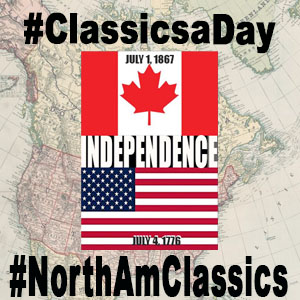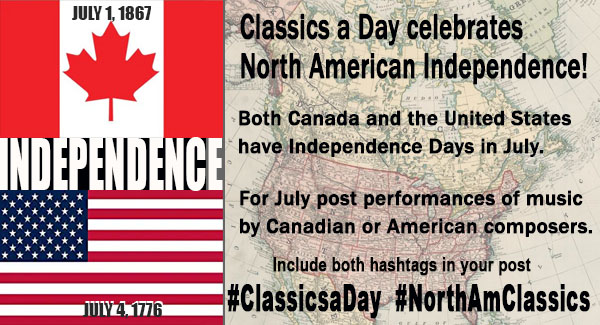
#ClassicsaDay #NorthAmClassics Week 4 2024
By Ralph Graves
Two countries celebrate their independence in July — and they just happen to be neighbors. On July 1, 1867, three separate British colonies were officially united. United Canadas, Nova Scotia, and New Brunswick became Canada.
On July 4, 1776, thirteen separate British colonies were officially united, becoming the United States of America.
The #ClassicsaDay challenge for July is to post music by Canadian and American composers. Both countries have created their own forms of classical music, independent of Europe’s.
Here are my social media posts for the fourth week of #NorthAmClassics. As in past years, I alternate between Canadian and American composers.
07/22/24 Alan Hovhaness (1911-2000): Symphony No. 1, Op. 17 “Exile Symphony”
Hovhaness’ first symphony was premiered by the NBC Symphony Orchestra under Leopold Stokowski. Stokowski would broadcast and record Hovhaness’ first three symphonies.
07/23/24 Alfred La Liberté (1882–1952) – Arabesque
La Liberté was a pianist and composer. He was a faculty member of the Canadian Conservatory of Music in Ottawa. He admired the music of Scriabin, and over time the two became close friends.
07/24/24 Harry Partch (1901-1974) – Sonata Dementia
Partch was a true outsider. He developed his own 43-note scale, his own musical theory based on it, and his own instruments capable of playing it.
07/25/24 Jocelyn Morlock (1969-2023) -half-light, somnolent rains
Morlock was composer-in-residence for the Vancouver Symphony. She died at age 54, cutting short a brilliant career.
07/26/24 Florence Price (1887-1953) – Violin Concerto No. 2
Price completed her second violin concerto a year before her death in 1953. For years it was considered lost. But in 2009 it was rediscovered in her former residence in Chicago during a remodeling.


